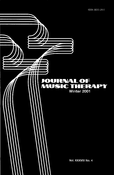-
Views
-
Cite
Cite
Wendy E. J. Knight, Nikki S. Rickard, Relaxing Music Prevents Stress-Induced Increases in Subjective Anxiety, Systolic Blood Pressure, and Heart Rate in Healthy Males and Females, Journal of Music Therapy, Volume 38, Issue 4, Winter 2001, Pages 254–272, https://doi.org/10.1093/jmt/38.4.254
Close - Share Icon Share
Abstract
Previous research suggests that while subjective anxiety is reduced by relaxing music, the effect of music on physiological stress indices is less consistent. In the current study, the effect of relaxing music on participants' subjective and physiological response to stress was explored, with attention paid to methodological factors and mediating variables that might have contributed to inconsistencies in previous studies. Undergraduate students (43 females & 44 males) were exposed to a cognitive stressor task involving preparation for an oral presentation either in the presence of Pachelbel's Canon in D major, or in silence. Measures of subjective anxiety, heart rate, blood pressure, cortisol, and salivary IgA were obtained during rest and after presentation of the stressor. The stressor caused significant increases in subjective anxiety, heart rate, and systolic blood pressure in male and female controls. These stress-induced increases were each prevented by exposure to music, and this effect was independent of gender. Music also enhanced baseline salivary IgA levels in the absence of any stress-induced effects. These findings provide experimental support for claims that music is an effective anxiolytic treatment, the robustness of which is demonstrated by retention of the effect in the presence of a range of potentially mediating variables.




